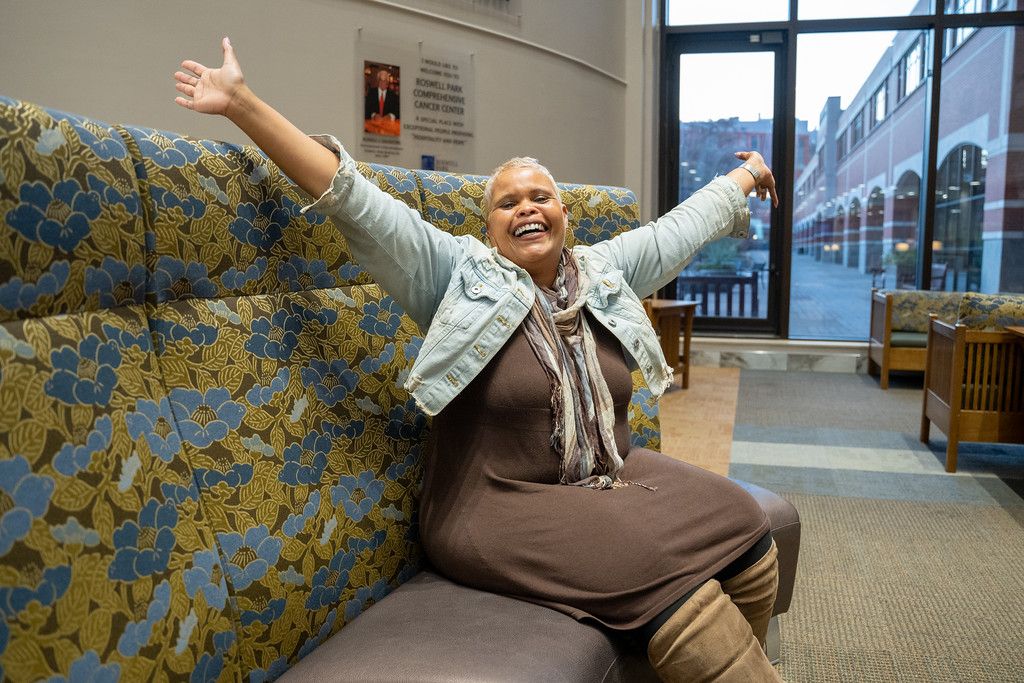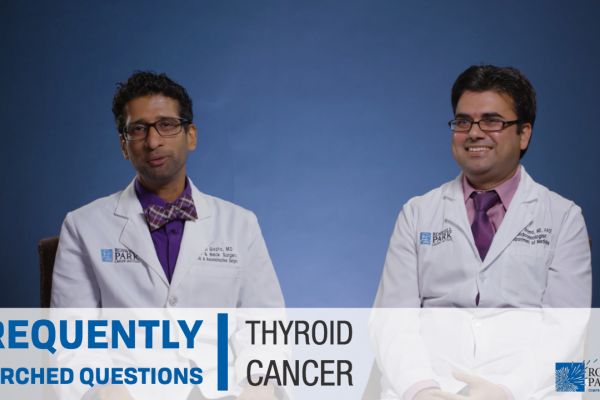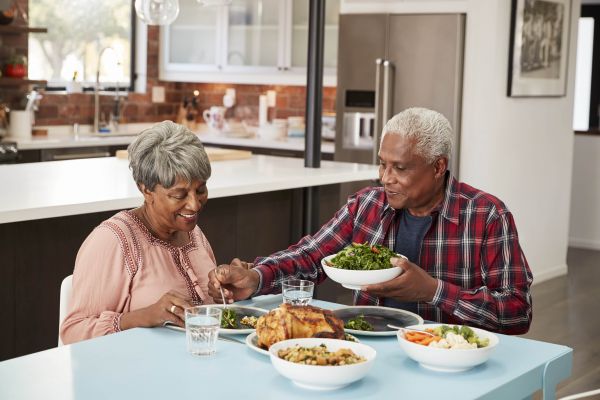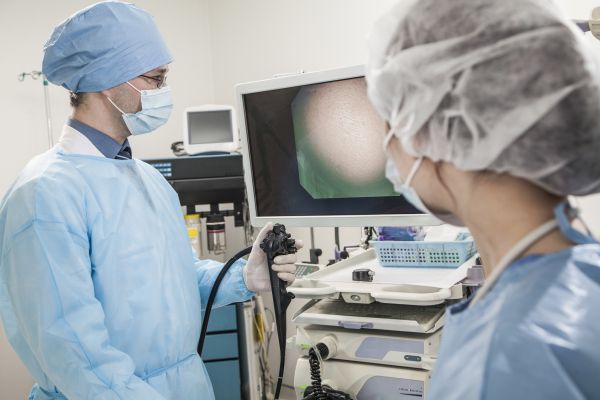From Roswell Park reluctance to champion
Despite being a reluctant patient herself, Angel Brasher wants to help change the perception of Roswell Park Comprehensive Cancer Center, especially within the African American community.
“I think everybody’s afraid of what Roswell Park represents, which is cancer,” she says, citing the old adage about not judging a book by its cover.
“Culturally speaking, Black people are suspicious of hospitals and medicine. The stereotype stems from the Tuskegee Experiment where we were used to test drugs, and dates back before then from a cultural aspect,” she explains. The Tuskegee Experiment – officially Tuskegee Study of Untreated Syphilis in the Negro Male – took place in Macon County, Alabama from 1932 to 1972, conducted by the United States Public Health Service and the Centers for Disease Control. “Roswell Park is not what you might think it is,” Angel maintains. “Roswell Park is not death. Roswell Park is hope.”
A diagnosis of the thyroid condition
A mother of four, grandmother of two and caregiver to her own mother, Angel Brasher was told about 10 years ago that she had Graves’ disease, a condition in which the thyroid gland is overactive and producing more hormones than needed. The doctor who diagnosed her didn’t seem to make a big deal about it, so she didn’t either because she didn’t feel sick. He told her it was important to take the prescribed medication, but nothing about the potential harm of non-compliance with treatment. When she noticed her hands were jittery, and that she was increasingly short-tempered, she just chalked it up to getting older. “I was the poster child of non-compliance,” admits Angel, now 47.
However, her best friend, who is a nurse, pushed her to take better care of her health. “She was the one who explained the prolonged effects Graves’ disease could have if I didn’t take care of it, how it affects your heart, affects your metabolism, your body temperature, your mood, everything,” Angel says. “It’s a spiderweb of things it can affect — eating, weight loss, weight gain, vision, just so many things on a day-to-day basis.”
Thyroid nodules may contain cancer cells
Prodded by her friend, Angel saw another endocrinologist who found she had goiter (enlarged thyroid) as well as nodules within the thyroid gland. “That’s when I was introduced to the ‘c’ word, you know, ‘cancer,’ because they can contain cancerous cells in them,” she recalls. As a self-defined “plus-size woman,” Angel knew she needed to lose weight, but didn’t realize that her longtime struggle with weight loss was connected to her thyroid issues. At one time she considered a gastric bypass, but was triumphant in dropping from 300 to 194 pounds after she began walking two miles a day and changed her diet. “I lost half a person,” she jokes amicably.
Angel’s condition was being monitored every three to six months, and she had undergone one biopsy when in 2020 she was told that she should have a second one. The goiter had grown so large and there were so many nodules that Angel named them. The second biopsy was inconclusive for cancer, but her endocrinologist was still concerned about their growth, which is a red flag for cancer cells. “That’s when she referred me to Roswell Park… and I cried,” Angel remembers. “When she said ‘Roswell Park’ I was, like, ‘is there any other place I can go besides there?’ And she said, ‘You have to trust me.’”
Years before, when she brought her daughter to Roswell Park for an evaluation, Angel’s first encounter was distressing. She considers herself to be empathic and says that when she walked through the front door back then, she was overcome by feelings and sounds of fear, anxiety, and pain.
Never miss another Cancer Talk blog!
Sign up to receive our weekly Cancer Talk e-newsletter.
Sign up!A better experience than she expected
When she came back to Roswell Park in early 2021, it felt different, she says. By then Angel had navigated through several surgeries and a serious mental health challenge, and her life perspective had changed. She was immediately impressed by the precision and kindness of Roswell Park’s patient care experience because she had endured vastly different encounters with other healthcare providers.
“Everybody was so helpful,” recalls Angel of checking in for her third biopsy. “From point A to point B, when you give them your name, they know exactly what you’re supposed to do and where you’re supposed to go. When I got to the room, they went over everything again, and that made me feel like they were paying attention to me. I felt like a real person.”
Her doctor was also different than those who had provided care in other settings. “He wanted to know if I knew what was going to happen, and asked me questions,” Angel says. “When he saw my expression, he said ‘Well, you don’t look like you know what’s going on. Do you need me to explain it again? I want to make sure you know when you leave here that you know what is going to happen.’”
She remembers that the nurse held her hand and talked her through the needle aspiration, which did identify some irregular cells. “The doctor explained that I could have a partial thyroidectomy or remove the whole thing, but that the decision was totally mine. He said they would do a full examination of my thyroid once it was removed and would let me know the pros and cons if I needed further treatment, but that my decision didn’t have to be made that day.”
So, Angel scheduled her next appointment, went home and, after talking with her family, decided to go ahead with a full thyroidectomy, removal of the entire thyroid gland, at Roswell Park.
“Everybody was just so nice,” Angel says of her three-day recovery there after the surgery. “The nurses and residents that came in to check on me were nice and upbeat and kept asking ‘Do you need anything?’ They communicated with each other, they communicated with me. They said, ‘We are a team here… this is your team.’ Who would have thought I would be laughing right after surgery?” She holds up her cell phone to show a photo of herself in the hospital bed post-surgery, smiling brightly.
Changing the perception of a cancer center
What Angel, who is a Fidelis membership services specialist, really wants to drive home in the African American community is that Roswell Park is hope, not death as many contend. “We judge Roswell Park by its cover because of its name. But when you start opening it up you realize that they’re about hope,” she says. “They’re about education, they are about strength, they are about encouragement, they’re about support. And warmth.”
She also wants to champion a message to African Americans and other people of color about proactively taking care of their health – about following through on appointments and screenings, especially when it comes to cancer.
“If I can change one person’s view about taking care of themselves that’s what I want my story to be,” she confides. “I want to let people know it’s scary, it’s terrifying, it’s gut-wrenching. You’re going to have sleepless nights; you’re going to worry. But you’re not by yourself and it’s worth the journey. And no matter what the outcome is going to be, it’s worth it. Had I not followed through I might not be sitting here right now. But I did.”
Editor’s Note: Cancer patient outcomes and experiences may vary, even for those with the same type of cancer. An individual patient’s story should not be used as a prediction of how another patient will respond to treatment. Roswell Park is transparent about the survival rates of our patients as compared to national standards, and provides this information, when available, within the cancer type sections of this website.



